By Stacey Gualandi/June 25, 2012
For more than 30 years, Lynn Sherr was a correspondent for ABC News, and I watched her religiously every Friday night on 20/20. But this talented writer has also authored many books on all kinds of topics from Susan B. Anthony to giraffes. Her latest book is on an unlikely subject, but one that I found out is her great passion and joy, swimming!
“The water is where I go to meditate, to celebrate, and to just feel better no matter what I’m looking for.” Lynn Sherr
I was thrilled to talk to her on The Women’s Eye Radio Show about Swim: Why We Love the Water, her outstanding career in broadcasting, and even how we all started out as fish. Here’s an excerpt from that interview…
STACEY: Hi Lynn. Why is it you write about so many different kinds of topics?
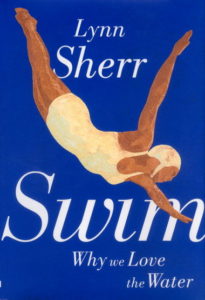 LYNN: It’s not so unusual if you know me. I only write books about things that I’m totally passionate about. People who know me know that I love giraffes. And they know that I love Susan B. Anthony. And if anyone knows me, you can figure out what my next book will be.
LYNN: It’s not so unusual if you know me. I only write books about things that I’m totally passionate about. People who know me know that I love giraffes. And they know that I love Susan B. Anthony. And if anyone knows me, you can figure out what my next book will be.
STACEY: So anybody who knows Lynn knows that this is a woman who will not live outside of the water. You say in your book that we started out as fish, right? I think I might have learned that many, many years ago.
LYNN: Yes. We were living in the primordial swamp and swimming around. And then, of course, one brave creature, maybe more, and maybe more, started to grow legs. They started coming out of the murk, and that was the beginning of land life. And we all started there.
I put that in the book because I was looking for the key to why we love swimming, or why I love swimming, and I thought maybe it had to do with paleontology and evolution. Maybe it’s the fact that it’s in our bones; it’s in our DNA.
But the truth is, even though we are very much like some fish in some ways and we do have remnants of fish structure in our skeleton, we are terrestrial creatures.
STACEY: You wrote that you started this book as a swimmer with a passion, and that you ended it knowing more about why. You describe swimming as being a salvation. Why is that?
LYNN: Because my body cried out for it. When I am stressed, I feel as if I want to be in the water. It calms me down. When I’m excited about something, I also want to be there. The water is where I go to meditate, to celebrate, and to just feel better no matter what I’m looking for.
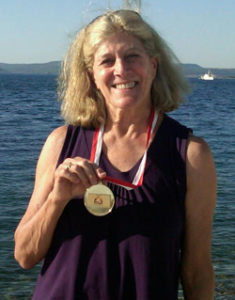
STACEY: What I liked about this book, too, is not only are you taking us on this exploration of what it means to be a swimmer, but you also undertook a four-mile swim of your own and interspersed that throughout the book. Was this something that you had always wanted to do?
LYNN: It had never occurred to me to be perfectly honest. When I decided to do the book, I thought I would just write about how much I love the water. I’m kind of a lazy lap swimmer and like the ocean, and the bay, and the lake, and blah, blah.
And then I thought, hold it, Lynn, you’re a journalist. You’ve always enjoyed and forced yourself to do what you’re covering as much as possible. So I thought I better sign up. I better challenge my mind and my body, and I better get my butt out there.
So I signed up for this swim, which was to swim across the body of water that used to be called the Hellespont. Now, it’s the Dardanelles. It’s the little channel of water that divides Europe from Asia and western Turkey, and it’s a race. As it turned out there were just over 400 swimmers from all over the world that did this.
I trained for this. I joined U.S. Master Swimming so that I could get faster and so that I knew what I was doing. I pushed myself to swim longer and longer amounts of time in the water. And I got there, and by gum, I did it. I crossed the Hellespont. I swam from Europe to Asia.
“I do want people swimming more. For one thing, it’s so good for our health.”
STACEY: And you did the four miles in a really good time.
LYNN: It’s only a mile, but the current is so strong, they don’t let you swim point-to-point because it would be too challenging. You might get swept past the finish line at the end because of the current going down.
So they have you do a big arc, and the arc winds up being around four miles. You’re only given 90 minutes because it’s a shipping channel, and they have to stop the ships for 90 minutes, so if you don’t do it 90 minutes, they fish you out.
Luckily, I did it in about one hour and 24 minutes. As you’ll see in the book where there’s a picture of me with my medal. I won my age group, so that’s kind of amusing and lots of fun.
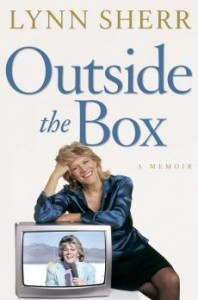
STACEY: What do you hope that people take from this book?
LYNN: I do want people swimming more. For one thing, it’s so good for our health. If people only understood that it’s the best full-body massage that you can get; it’s also the cheapest antidepressant. Swimming may be good for us in terms of aging and actually help keep us young.
STACEY: It’s interesting too because you’ve had many highs. You’ve had some lows in your life in dealing with cancer in your life as well. How did swimming help you get through your journey with colon cancer?
LYNN: It did help because I swam all during my chemotherapy. And it was very important for me. Again, it’s my salvation. It’s where I feel good. It let me stretch my body, and that to me is terribly important. I just need to be in the water.
I didn’t do it at first. When you go through chemotherapy, they don’t want you anywhere near possible germs when you’re prone to infection. So there were times I couldn’t swim. But when I could, I was in the water, and that did it for me.
STACEY: One person you have written a lot about is Susan B. Anthony. She is certainly one of your heroes. One of her quotes is “Failure is impossible.” Are those some of the words that you like to live by?
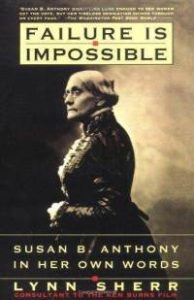 LYNN: I do like to live by them. That’s Susan B. Anthony, of course, and she was talking about getting women the right to vote, and of course, it didn’t happen until after she died, but it did happen. And yes, that is a mantra for me.
LYNN: I do like to live by them. That’s Susan B. Anthony, of course, and she was talking about getting women the right to vote, and of course, it didn’t happen until after she died, but it did happen. And yes, that is a mantra for me.
The connection here is that when I find something I care about, I get a little obsessive, and I want to know every single thing about that person, or that thing, or that activity, or that moment. So I wanted to know everything I could know about swimming. I wanted to understand what made Susan B. Anthony tick, the same way I wanted to understand everything there was to know about giraffes because they stole my heart.
STACEY: I never knew they were called tall blondes, the name of your book.
LYNN: That’s my term for them. But I wanted to know everything about swimming because I wanted to know the magic and the mystery, and if there was anything else I needed to know. It just was so much fun digging all this stuff up.
What I’ve discovered also is that swimmers love, love, love swimming and love talking about it. This book has been so much fun for me to see their reaction because their eyes widen. I tell them some of the stuff I’ve learned, and they’re just fascinated. So that’s been very satisfying for me.
STACEY: Definitely. Whom have you heard from?
LYNN: I’ve heard from some of the swimmers that did the Hellespont with me, many of whom I never met when I was there. But they’ve now seen the book, and they’re so excited that there’s now a record of that swim that they can show to people because I’ve, as you see, talked about so much of it throughout the book.
I’ve heard from many swimmers all over the country. There’s an email address on the jacket of the book where people can write directly to me, and I respond to everybody. And people are just writing to tell me their stories.
“I get out of the water and I’m always smiling, and I think most swimmers feel that way.”
It’s not that I’m out on a crusade as much as I am trying to say look at this wonderful thing. It cannot only save your life if you learn how to swim, and you might be in a drowning situation, but it might save your life as a regular old earthbound human being because it makes you feel good. Swimming will change your attitude towards lots of things.
STACEY: I feel the same way too. So this is something that is very much a passion for you. Do you miss doing 20/20 and that kind of work?
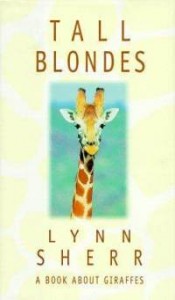 LYNN: I miss a little bit of the water cooler thing, which is to say the camaraderie. But essentially, all of my friends are gone from there now, so we have our own lunches, and we make our own water cooler. And isn’t it interesting that some of the social media has become the water cooler in a way.
LYNN: I miss a little bit of the water cooler thing, which is to say the camaraderie. But essentially, all of my friends are gone from there now, so we have our own lunches, and we make our own water cooler. And isn’t it interesting that some of the social media has become the water cooler in a way.
I have a little muscle madness reaction. When I hear a siren, my body almost goes in the direction where the siren is. But, guess what, not really because I’m doing quite a lot of freelance writing, and television and broadcasting. I get to cover various things that I would have done for 20/20.
I keep my hand in politics. I’ve written about Michelle Obama, Dr. Jill Biden, Rick Perry and Anne Romney. I’m quite happy not having one assignment desk to run my life, but being able to determine what I want to do, and where I want to go.
STACEY: You’re so effective at that. I love that somebody once called you the Annie Oakley of network correspondents.
LYNN: Oh, my goodness, I never heard that. I’m flattered. I love Annie; she was a sure shot. She always got her target.
STACEY: I’m sure you’ve been hearing about this “war on women,” and the subject of equal pay. Do you think that there is a definite war on women right now?
 LYNN: I certainly think there’s something, and I don’t think it’s good for women. It is very troubling to me because I’m one of these people who thought that when we — that is to say my generation of professional women — kicked in a bunch of doors in the early ‘70s, we thought we were doing it for everyone else, and that it was done. We were doing it for others, but if it’s not done, it’s terrifying.
LYNN: I certainly think there’s something, and I don’t think it’s good for women. It is very troubling to me because I’m one of these people who thought that when we — that is to say my generation of professional women — kicked in a bunch of doors in the early ‘70s, we thought we were doing it for everyone else, and that it was done. We were doing it for others, but if it’s not done, it’s terrifying.
STACEY: Are there subjects right now that are getting you excited or things that you’d like to report on or ideas for your next book?
LYNN: I don’t want to talk about what my next book will be because I’m just not sure, and there’s a bunch of subjects rattling around in my head. Frankly, I could talk about women’s issues all day long, as you well know, because I’ve written about it.
In Swim: Why We Love the Water, there’s a lot of stuff in it about women because women and men are pretty equal in the water. Yes, men can go faster, but women can do other things in the water that men can’t. The water is a great equalizing element.
STACEY: I have to tell you that I really enjoyed your book, and I want to thank you so much for having this conversation. Excuse me now but I’ve got to go run and jump into the pool!
Lead Photo: Steve Fenn/ABC News
TWITTER: @LynnSherr
###
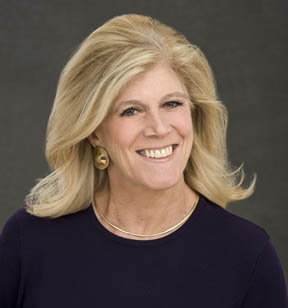



Leave a Reply